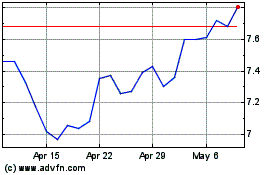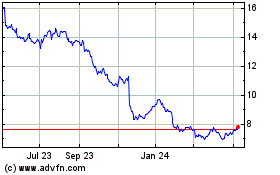Despite Rulings, Farmers Remain Loyal to Roundup
March 21 2019 - 10:07AM
Dow Jones News
By Jacob Bunge
Farmers are standing by Bayer AG's Roundup herbicide despite
rulings from two juries that the world's most widely used
weedkiller caused cancer in plaintiffs.
The chemical, used on the vast majority of corn, soybean and
cotton acres planted in the U.S., remains prized by farmers for its
low cost and effectiveness.
"I don't have any concerns with safety," said Danny Murphy, who
raises soybeans and corn near Canton, Miss. Mr. Murphy on Wednesday
was preparing to apply glyphosate to his soybean fields after a
bout of wet weather over the past week delayed his work.
A U.S. District Court jury in San Francisco on Tuesday found
that exposure to Roundup, a glyphosate-based herbicide, caused a
man's cancer. It was the second such ruling since July against
Bayer, which markets Roundup and is one of the world's biggest
glyphosate suppliers. The company faces more than 11,000 similar
lawsuits filed by U.S. farmers, landscapers and gardeners.
Farmers in the U.S., Canada, Brazil and other countries have
boosted their use of glyphosate since the mid-1990s, when seed and
pesticide maker Monsanto introduced crops genetically engineered to
survive the chemical. Bayer, which acquired Monsanto in 2018, said
farmers know how to use glyphosate safely.
"They are well-educated on this subject and know that regulators
around the world have examined glyphosate's safety and concluded
that it can be used safely," a spokesman said.
Biotech crops helped make glyphosate the most widely used
weedkiller in the world, accounting for around $5 billion in annual
global sales, or roughly one-fifth of the entire global pesticide
market, according to Sanford C. Bernstein analysts.
Regulators like the U.S. Environmental Protection Agency and the
European Chemicals Agency have deemed it safe to use, including in
reassessments in recent years. The World Health Organization's
International Agency for Research on Cancer in 2015 classified
glyphosate as a probable human carcinogen, raising concerns over
its safety and fueling lawsuits against Bayer.
Using mechanized spraying equipment, U.S. farmers apply nearly
300 million pounds to their fields annually, according to data from
the U.S. Geological Survey. In the U.S., more than 90% of corn,
soybean and cotton acres are genetically engineered to withstand
herbicides, mostly glyphosate.
Farmers say they prefer glyphosate to harsher weedkillers such
as paraquat and atrazine. Those chemicals tend to linger in soils
and don't break down as quickly as glyphosate, farmers say.
Glyphosate also has been regarded as less toxic to humans.
So far, the jury verdicts haven't affected glyphosate sales in
the U.S. Farm Belt, where skepticism of lawyers and lawsuits often
runs high. Some farmers worry that lawsuits could drive glyphosate
prices higher if manufacturers like Bayer raise prices to cover
litigation costs or that regulators could add new restrictions on
how it is sprayed.
Near Waverly, Iowa, Mark Mueller said he considers the herbicide
essential to sustainably farming his 1,600 acres. For the past
decade, Mr. Mueller said, killing off weeds with Roundup has
allowed him to stop tilling his corn and soybean fields each fall,
a practice that can raise the risk of erosion washing away valuable
topsoil.
Similar reasons have increased glyphosate use among overseas
farmers, including Karen Williams, who raises sheep, cattle and
crops on 580 acres just north of New Zealand's capital city of
Wellington. Spraying glyphosate and avoiding tilling has helped
reduce soil lost to high winds, she said.
"If you take that [herbicide] out of the toolbox we would have
to completely redesign our farming system," said Ms. Williams.
Jay Feldman, executive director of Washington-based advocacy
group Beyond Pesticides, said many corn and soybean producers don't
see ready alternatives to glyphosate. A five-year downturn in the
U.S. farm economy has left farmers reluctant to deviate from
established products, he said, and many remain invested in biotech
seeds designed for use with the spray.
"Farmers feel like they're locked into these practices and don't
have a choice," Mr. Feldman said. He said the rising focus on
glyphosate has helped drive sales in the organic sector, where
glyphosate isn't used.
--Lucy Craymer contributed to this article.
Write to Jacob Bunge at jacob.bunge@wsj.com
(END) Dow Jones Newswires
March 21, 2019 09:52 ET (13:52 GMT)
Copyright (c) 2019 Dow Jones & Company, Inc.
Bayer Aktiengesellschaft (PK) (USOTC:BAYRY)
Historical Stock Chart
From Mar 2024 to Apr 2024

Bayer Aktiengesellschaft (PK) (USOTC:BAYRY)
Historical Stock Chart
From Apr 2023 to Apr 2024
